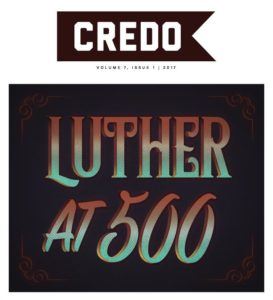The young, newly ordained Catholic priest stood in front of the church, ready to officiate his first mass. These priests were expected to have clean hearts before officiating—no sin unconfessed. No heart of stone unturned.
But as Martin Luther began to recite the introductory portion of the mass, with the bread and wine on the altar in front of him, he almost passed out. He later recounted, “I was utterly stupefied and terror-stricken. … Who am I, that I should lift up mine eyes or raise my hands to the divine Majesty?”[1]
On October 31, 1517—a decade after his ordination as a priest—Luther nailed his now famous Ninety-Five Theses to the door of the All Saints’ Church in Wittenberg, Germany. Of all these 95 affirmations and concerns, the main point was simple: you can’t buy God’s grace and you can’t trump the Bible. The Church missed this, and that’s a dangerous place to be. For Luther, unmitigated access to God’s revelation and God’s grace was of utmost importance.
He was frustrated because the Church had not felt the same level of reverence—terror!—when standing before God. It had begun selling indulgences, which were certificates from the Church that guaranteed to reduce the punishment of sins. As Luther saw it, money was also corrupting everyone in power. On top of that, the Church taught that the Pope could receive direct revelation from God—that he had the same power and access to God’s will as the Bible. These problems and more pushed Luther to the edge. Like any good leader, he took action. Like any good pastor, he cared for his people. He stepped out when, apparently, no one else would.
An Accidental Reformation?
It’s important to understand that Luther wanted to reform the Church, but he didn’t want to spark a divisive reformation. He wasn’t trying to start a new denomination—he was just trying to be faithful to God’s Word. As he once said, “I ask that men make no reference to my name; let them call themselves Christians not Lutherans.”[2] But his convictions were strong, and his concerns were legitimate. The gospel compelled him to ignore the dangers associated with stepping out on faith, even when the road wasn’t going to be easy. Proclaiming the truth meant more to him than the backlash he would receive for defending it. As he once said: “What is asserted without the Scriptures or proven revelation may be held as an opinion, but need not be believed.”[3]
The Church had moved dangerously into the territory of extrabiblical opinion and assertions. Luther couldn’t stand for it, because reading the Bible was the primary spark in his transformation from Catholic monk to revolutionary. So, he eventually stood before the leaders of the Church and proclaimed,
“I am bound by the Scriptures I have quoted and my conscience is captive to the Word of God. I cannot and will not recant anything, since it is neither safe nor right to go against conscience to the Word of God. I cannot and will not recant anything, since it is neither safe nor right to go against conscience.”[4]
When Luther began to see that the Church’s practice was not lining up with God’s Word, he had a choice to make: suppress his conscience or listen to it. Click To Tweet As an aspiring priest and preacher, he felt the weight of being faithful to God’s Word. He once wrote,
“It is a glory which every preacher may claim, to be able to say with full confidence of heart: ‘This trust I have toward God in Christ, that what I teach and preach is truly the Word of God.’”[5]
Luther didn’t view Scripture’s authority as a piece of the Christian puzzle, or an important but not ultimate doctrine; it was the concrete slab on which the Christian house stood. For him, the preacher’s primary task was to preach God’s Word rightly because of its sheer power and unchangeable truth. So when the Pope exercised authority apart from Scripture or in contradiction to Scripture, Luther would have none of it. Scripture + anything else = truth mixed with error. Very quickly, his Reformation became a revolution.
Luther’s Bible: a Bible for Everyone
Luther understood the Bible’s power to change lives, because he himself had his life changed by it. His reading of Romans 1:17 changed the course of his life, and he was never the same. Not only that, but he loved the Word so much that he dedicated years of his life to translating the New Testament into German, his native language. When it was published in 1522, he was elated that people “might seize and taste the clear, pure Word of God itself and hold to it.”[6] Luther thought the Bible was more important than any book anyone could ever savor. The Church at the time didn’t allow massive access to the Bible. Most people only knew what the priests told them. But Luther knew that God had met him in its pages, and he longed for others to have that access.
To Luther, the Pope was more like a bad king than a good pastor. Click To Tweet He abused his power and sought to control the people. The Word of God no longer controlled the Church—its leader did. A Church with a minimized Word is not a Church at all; it’s a train without tracks, a winding mountain road without guardrails. With his translation, people could see the guardrails for themselves.
Luther’s convictions remind us that if God is the ultimate authority, then his words are good and true. He is perfect, so his Word is perfect. His commands are right, and our obedience to them is right. No pope or president or self-help book can outdo what God has to say to us. That also means that no matter what a leader does, even the Pope himself, God’s Word has the final say.
For Luther, the Bible’s truthfulness wasn’t about putting its claims into a Petri dish and seeing if it passed the test. He didn’t need a pope or a scientist or anyone else to authenticate its claims. He trusted Scripture because he trusted God. Believing in the authority of God’s Word takes action. The Word of God is alive, and it’s ready and able to change your life, if only you’ll submit to its authority the way Luther sought to.
The Reformation caused a massive split in the global Church. Protestants (literally, “the protesters”) were born. And Protestants are a people of the Bible first and foremost. It’s in the Bible that we find who God is and how he relates to his people. Following in the footsteps of Luther, Protestants believe that when Scripture speaks, God speaks.
If we believe nothing else, we should believe this: God’s Word is alive. The Bible is not some outdated, crusty book that fits better on a shelf than in our laps. No, it sits there rumbling like an earthquake, holding in the life-changing words of the God of the universe. It is applicable to your life now. Today. And tomorrow, too.
If we believe that Scripture truly is the Word of God, we will believe what it says. Like Luther, we will believe that a doctrine is true only if it’s found is in the Bible.
____________________________________
Endnotes
[1] Roland H. Bainton, Here I Stand: A Life of Martin Luther (New York, NY: Meridian, 1995), 30.
[2] Martin Luther, “A Sincere Admonition from Martin Luther to All Christians” (1522), in Luther’s Works 45, ed. Walther I. Brandt (Philadelphia, PA: Muhlenberg Press, 1962), 70.
[3] Quoted in Timothy George, Theology of the Reformers, 2nd Edition (Nashville, TN: B&H Academic, 2013), 81.
[4] Martin Brecht, Martin Luther, trans. James L. Schaaf (Philadelphia, PA: Fortress Press, 1985), 1:460.
[5] Martin Luther, Martin Luther’s Ninety-Five Theses and Selected Sermons (Jersey City, NJ: Start Publishing, 2012). This edition is in digital format without page numbers.
[6] Michael Reeves, The Unquenchable Flame: Discovering the Heart of the Reformation (Nashville, TN: B&H Academic, 2009), 55.


